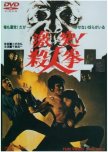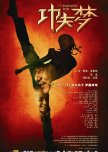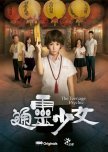
"There are times when the right choice is not always the moral choice"
Tokyo Vice Season 2 started off where S1 ended with characters’ lives in jeopardy or completely snuffed out. With Tozawa in the wind, the drama took the time to explore other crimes in Tokyo and the private lives of the journalists. When the Dark Lord of the Underworld returned with a diabolical strategy to own Japan, the heroes would be put to the test. While not as taut as the previous season, S2 was still engaging.Due to serious threats against them, Jake and Katagiri are forced to lie low. Ishida draws Sato closer into his confidence after the attacks from S1 even as he makes a returning yakuza his second in command. When Sato’s brother is courted by the new Oyabun it leads a reluctant Sato on the path he had never wanted but cannot seem to escape. Samantha mourns the loss of her friend as she opens her new club. Having the yakuza for a business partner begins to take its toll. Things at the newspaper are going smoothly until Tozawa returns and our intrepid gang of journalists and police officers discover that neither the newspaper nor the police department are willing to take on the Dark Lord of the Underworld. When all seems lost an unexpected ally arises to bring help when they need it. The good guys will have to dirty their hands and cross lines that can’t be uncrossed if they want to bring Tozawa down.
The first few episodes took some readjustments in expectations after the powerful ending of S1. Having been credibly threatened by Tozawa, both Jake and Katagiri had to keep their investigations under the radar and focus on pursuing other stories and cases. The drama became more episodic procedural until Tozawa returned and upended everyone’s lives. The private lives of the journalists were explored which will be hit or miss determined by your interest in that angle. Even though little time had passed Jake was less titchy and agitated yet still arrogant enough to believe he was always right. His position at the paper seemed well established. Sam’s behavior was more empathetic for a girl on the hustle. Unchanged, Katagiri was a rock and the guy you wanted in your corner and not as your enemy. After the break in trust from the last season, Jake earned it back, with Katagiri stepping into a sensei or surrogate father role to the brash journalist. The two adrenaline junkies were dogged in their desire to expose Tozawa’s sinister plot. Emi came into her full power as she defied her supervisor in pursuing the risky stories. Her love life seemed to suspiciously follow Sarah's from Love Actually. Most of the sexism and racism from the first season were gone in the second. The rigid system of invisible rules and alliances stayed in place. Katagiri, Jake, and Emi would all make decisions to bring about justice that would have consequences.
Like Jake and Katagiri, I was impatient for Tozawa’s return. The malevolent yakuza drove the action in season 1 and in season 2 as well. When he was off-screen the characters were treading water unaware that the great white shark was biding his time, lulling them into a false sense of security before striking again. I enjoyed the growth in different characters as they were all propelled toward the culmination of deeds and revenge. There were lapses in continuity and logic when the heroes were in deep water swimming with the sharks. Despite those lapses, Tokyo Vice served up a deliciously satisfying ending.
4 April 2024

"When you think you're safe is precisely when you're most vulnerable"
Seven Samurai is not just a movie about fighting samurai, this film calls out the injustices prevailed on the common people by the warring ruling classes and class delineations. Kurosawa’s 3 ½ hour film would appear to be too long, and truthfully on previous viewings, I felt that way. But this time having learned to be comfortable with his world and character building, I settled in and watched as he wove a complex story out of a simple one. Kurosawa is a master at teaching and rewarding patience.“You all make great scarecrows. Problem is, the enemy isn’t a bunch of sparrows and crows.”
A small village of peasants whose crops are routinely plundered by the local bandits make a desperate all-in decision. Rather than risk starving and losing their women to the thieves they determine to find samurai hungry enough to protect them for food but not so strong as to be a more dangerous alternative than the bandits. Kambei is recruited first after he rescues a small child from a thief. From there Kambei puts together a team of six willing samurai. A seventh “samurai” refuses to be dismissed and follows them anyway. Kikuchiyo will prove vitally important as a link to the farmers. Kambei develops a plan to protect the village from 40 bandits on horses and armed with muskets with only seven warriors and untrained villagers with bamboo spears. Though the odds are not in their favor this new team of uneasy allies does not back down.
“In life, one finds friends in the strangest places”
The story occurred in one of Kurosawa’s favorite settings, the Sengoku period during the 16th century. While the classes were separated, there was still miniscule room for movement. At the same time, there was a belief that poverty and suffering was the fate for peasants and many of the samurai interviewed refused to help them. There was no reward, no chance for glory or increased rank, no lord to serve. Only those who enjoyed battle or were hungry or had sympathy for the peasants were willing to join.
“Who turned the farmers into such monsters?”
Civil wars had been devastating for the peasants who always have the smallest of safety nets in any time period. For these farmers, the samurai were not much different than the bandits. In a key scene, brilliantly played by Mifune Toshiro, Kikuchiyo upbraided the six when they were horrified to discover armor the farmers had stolen or killed fleeing samurai for. He quickly put things in perspective. Samurai murdered, pillaged, raped, and burned just as the bandits did only under the guise of “honorable” warfare, the end was the same for the farmers. Inviting samurai into their village could be the same result as bringing a tiger to the front door to chase wolves out the back. Someone always coveted the valuable rice and barley the farmers grew. Powerless farmers were left with little to barter with except their women and their lives keeping them in a perpetual state of fear.
“By protecting others, you save yourself”
Samurai Heihachi designed a flag displaying the growing cooperation between the disparate groups. Kambei and Kikuchiyo along with the other samurai and lead peasants forged a transformation of societal boundaries. The two sides slowly learned to trust each other building something new and important. But would it last?
“There’s nothing heroic about selfishly grabbing for glory”
Kurosawa regular Shimura Takashi played Kambei Shimada, the leader of the samurai. This is by far my favorite role of his despite loving Ikiru. Shimura was calm, wise, wily, and also had a sense of humor. He owned every scene he was in and it was quite believable that he instilled confidence and commanded respect from both samurai and villager. His performance was brilliant as the leader who eschewed the need for glory and demanded complete selflessness. Another Kurosawa regular, Mifune Toshiro, and one of my favorite actors, played the slightly and sometimes not so slightly, unhinged Kikuchiyo. It was a role similar to the one he played in Rashomon. Overflowing with kinetic energy and emotion, he never stepped out of character, never reverted to the ultra-cool samurai he was capable of playing. Kimuro Isao as the youngest samurai, Katsushiro, displayed the awe of the men around him and the fear of first battle and first love. The other samurai were capably played and carefully developed as individual characters instead of bland backdrops. Even several peasants were highlighted.
“I defended my post”
Using his three-camera technique for the first time, Kurosawa blended the action to convey the tension of death and battle. His customary blowing dust skittered across the scenes as moods changed. While there was emotional music, his most successful background sounds for me were the beating drums of war approaching even as songbirds sang and flowers bloomed. As the rain fell during the final battle, it was hard to distinguish samurai from peasant. Side by side they fought viciously and heroically regardless of the consequences, regardless of rank, regardless of whether they or their alliance survived. Seven Samurai fought not only bandits but distrust and social injustice with only one side in the triangle of power capable of winning. If you can let Kurosawa slowly envelope you in this world he created with good and evil and every shade of gray in between you’ll be rewarded with a captivating film superbly made.
27 March 2024

"You're disgusting, you make me sick!" Preach on sister!
The Street Fighter was violent, exploitive, and had almost no redeeming qualities. Takuma Tsurugi was the manliest man to ever man which means he got a pass for sexual assault and selling a woman into sex slavery. This was a violent film just to be violent, with little story to go with it.Takuma breaks a death row convict out at the last minute. When the convict’s brother and sister can’t pay the last installment he begins to rape the sister. The brother tries to intervene, so Takuma kills him, and sells the sister to be a sex slave. Big man. A group attempts to hire him to kidnap an heiress but he turns down their lowball number. Because Takuma knows of their plan they attempt to eliminate him which drives him to be the heiress’ protector. After forcibly kissing and groping her, he's hired on to protect her. When the convict discovers what happened to his family he joins the other bad guys for the chance to free his sister and kill Takuma. Yeah, at this point I’m rooting for anyone who would kill this b@stard.
The fight scenes weren’t well choreographed and I hated Sonny’s fighting style and acting. The editing was even worse. At one point Takuma asked his sidekick, “How did you get here?” I was expecting Ratnose to say, “Heck if I know!” It was as if they edited out anything that would have caused the story to make sense. The story jumped around and so did the people as if they had a transporter to drop them into a completely unrelated scene. The acting was bad even for a 1970’s martial arts film.
The Street Fighter failed on every account for me. Only for Sonny Chiba fans and those who enjoy the main lead behaving reprehensibly toward women. This movie put the mindless into mindless violence. At the end of the film, in big letters it declared “Return of the Street Fighter coming soon!” Thanks for the warning.
14 March 2024

"The best fights are the ones we avoid"
How you feel about The Karate Kid remake may largely depend on how old you were when you first watched it and how old you were when you watched the original. Despite the title, in the remake they practiced kung fu, not karate, and Xiao Dre was quite a bit younger than Daniel-san had been. Other than those elements and the Chinese travelogue inserted, the basic storyline was the same.Twelve-year-old Dre has to leave everything behind when his mom is transferred to Beijing, China. While his mom looks at it as an opportunity, Dre feels left adrift. On his first day in his new home, he runs afoul of the local kung fu bullies and is beaten. He also meets sweet Mei Ying who is a classmate and violinist. After the maintenance man saves him during a vicious beating, the story is set up for Mr. Han to train Dre in kung fu.
Jaden Smith’s size made him a perfect target for bullies and it was easy to see why Dre would be afraid of Cheng and the pack he ran with. The Kick Them in the Dragon Balls School of Kung Fu mantra of “No Weakness! No Pain! No Mercy!” didn’t leave a lot of room for negotiation, especially with its abusive and sadistic master. Taraji P. Henson was gorgeous and tenacious as the over-protective mom. Jackie Chan gave a subdued performance as the mentor, Mr. Han. He only had one fight and it was with the prepubescent bullies. The kids who played Cheng and Mei Ying were adequate.
The cinematography and scenery were beautiful. There were trips to the Forbidden City, a kung fu monastery on a mountaintop, and training on the Great Wall of China. I suspect the last one is a big no-no in real life. The strange new home upped the ante on the fish out of water trope, especially when Dre didn’t speak any Mandarin. The travelogue elements while stunning, also hampered the movie as the pace was already doggedly slow. No kung fu movie needs to be 2 ½ hours long. There was also the change to the kids’ ages that I found troubling. In the original, Daniel, Ali, and Johnny, were on the verge of becoming adults. They were high schoolers where the romance seemed more natural and the fighting more acceptable. In the 2010 Karate Kid, these were 12-year-olds beating each other senseless. No wonder Mei Ying’s parents didn’t want her seeing Dre.
The original film wasn’t great but it was a touchstone for kids during that simpler time period just as this one may have been for its generation. Both Karate Kids showed that there are jerks and good people everywhere. Xiao Dre learned to show respect for his mom, his sifu, his new home, and himself. He also discovered that success required focus and dedication. The 2010 film was a fine addition to the Karate Kid family, if only they’d changed the name to correctly reflect the skill being taught. RIP Mr. Miyagi. No one can take your place in my heart.
8 March 2024

Michelle Yeoh and non-stop action!
In the Line of Duty: Royal Warriors showcased Michelle Yeoh’s rising star power. Only twenty-four at the time she had no problem carrying this film. Sanada Hiroyuki joined her making for an appealing and high kicking duo!Flying home to Hong Kong, Officer Michelle Yip and retiring Interpol agent Yamamoto become involved in a high jacking. Air Marshall Michael Wong is along for the ride as well. After defeating the two criminals, they are hailed heroes. What they don’t realize is that the now deceased “Tiger” has buddies who are seeking vengeance. From there family members are murdered, a break neck car chase takes place, later a shootout in a nightclub raises the body count, and finally an explosive battle determines who will live and who will die.
Royal Warriors was a quintessentially 1980’s cop film. It was ultra-violent, there were numerous explosions, it had a destructive high speed car chase, and a shootout in a nightclub with flying glass and bodies everywhere. You did not want to be the loved one of a cop in this era because the odds of you making it out alive were zero to none. And the nostalgia factor also shown through for me. There was a poster for my favorite movie, LadyHawke, in the background. Items you don’t see anymore like audio cassettes, boom boxes, video tapes, phone booths, and cell phones that resembled WWII walkie-talkies made their appearances.
The complex fights were no problem for Michelle Yeoh as she was athletic, fast, and agile making the moves look natural. She was in great form in this film. Sanada Hiroyuki was also able to deliver fists and kicks believably. Mang Hoi’s choreography made for thrilling fights as the two officers battled the different bad guys in deadly confrontations. No two fights were alike and the stars of this film were exciting to watch. One fight even included a chainsaw and another, a coffin! There was also plenty of gunplay for those who prefer their violence to be packed with not just punches but high-speed lead.
Lam Wai and Michael Chan conveyed their villains in quiet deadly fashion. Pai Ying preferred to chew the scenery with his maniacal “Bandana”. As I mentioned, Michelle and Hiroyuki played their roles quite well. Michael Wong’s Michael seemed out of place. Everyone else was in a brutally violent film and he acted like he was in a romantic comedy. The character seemed badly out of place. I suppose the writers felt the need for some humor in the dark and deadly film, but Michael came across as annoying instead of funny. The attempt at a romance also failed.
Though the technology and ultra-violent deaths for civilians date it, the movie largely holds up today. The action was nearly constant and well choreographed making for an entertaining movie. The writers did Michelle a solid and didn’t make her have to be rescued or have the male lead take down the bad guy in the end as so many films have done with strong female leads. There were no histrionics, just a powerful woman doing her job and taking out the trash. Michelle Yeoh shone brightly and would develop her screen persona even more after this film. If you like martial arts films, 1980’s crime films, or the girls with guns genre, this is one try.
4 March 2024

"Dying is easy, surviving is hard" Getting through this movie was harder
Fist of Legend (2019) aka Legend of Chenzhen aka Fist of Legend/II was a prequel of sorts to Jet Li’s Fist of Legend from 1994. This was a cheaply and poorly made movie that would have looked out of place in 1994.Chen Zhen is in Japan as a student to learn about the enemy so that he can go home and help protect China. He falls for Mitsuko whose uncle is the virtuous president of the Black Dragon Society. Also interested in Mitsuko is the vile Black Dragon VP Chiyo Shinobu. Chiyo is in cahoots with evil military Col. Fujita. They are looking to bring down the Black Mask who has made fools of their samurai on the streets and they think it is Chen Zhen. Chen Zhen has been ordered to keep his head low which he accomplishes until Chiyo goes too far.
This movie lacked any spirit to it and was filled with problems. Chen Zhen was given zero personality. Huang Wei Ting as Mitsuko tried to double up her energy level to replace his. One of the problems with non-Japanese playing Japanese is that they don’t know how to walk in kimonos and as someone who has watched my share of Japanese movies, it comes across as awkward. Xu Shao Hang was a handsome if heartless Chiyo. There were “Americans” who looked anything but. The military uniforms appeared to be more Russian or German than US. You know a movie is desperate when it contains not one, but two sexual assaults and a repeat of one of those. The dubbing was awful, the green screens obvious, and the music played loudly over the dialogue on several occasions.
It’s a kung fu film, so maybe the fights were good. Unfortunately, most of the fights were awful and relied on quite a bit of wire work. The trained samurai were nice enough to come at Chen Zhen one at a time and not know how to swing their swords while samurai in the background just waved theirs around in the air. The fight choreography was abysmal for a 2019 production. It’s too bad because Tiger Xu moved well enough to handle better fight scenes. And story-wise, why would Chen Zhen wait until what appeared to be midday to rescue his girl after he knew she’d been kidnapped that night? Good job there hero.
Fist of Legend was populated with pretty people but lacked in everything that would make a film interesting. Even at 77 minutes it felt overly long. Plus, it might cause eye strain for all the times you'll feel like rolling your eyes at the ridiculous scenarios and terrible fight scenes. This film is just watchable, especially if you aren’t familiar with martial arts movies or have a need to watch all the movies about the fictional character Chen Zhen. There are better movies about the Black Masked warrior out there.
2 March 2024

"You'll see me in your dreams tonight"
Days of Being Wild showed what lengths broken people would go to in order to find the object of their desire. Time, whether it hastened by too quickly or dragged like a cement block, tethered the characters to their obsessions. Everyone had a myopic gaze of life and much of it revolved around a self-obsessed rebel.Yuddy had a habit of seducing women and then breaking their hearts. Raised by a sex worker, he desperately wanted to know who his biological mother was. Rebecca had told him his mother was a Filipino noblewoman who had paid her to raise him. Mom really put a lot of thought into that one, didn’t she? Yuddy seduced Su Li Zhen who ran a snack stand and box office by having her look at his watch for a minute. One minute before 3:00 was to be burned in their minds on that date. Their relationship flared and flamed out when Li Zhen realized he would never marry her. Before he could change the sheets on his bed, he’d seduced exotic dancer Mimi.
Women were obsessed with Yuddy---Li Zhen, Mimi, and even his adoptive mother Rebecca. And I never could figure out why. He thought only about himself and constantly told them what they could and couldn’t say. He must have been one hell of a lover to make them lose their dignity and hearts over him. Young love is often messy and impulsive with heavy doses of heartache and drama but it was hard to understand why these women found him so irresistible. How desperate for love, sex, and/or companionship they must have been. Loneliness can be a harsh mistress.
Yuddy often compared himself to a bird with no legs who had to keep flying when in reality the bird had been dead all along. The story lost steam when he left Hong Kong to find his mother in the Philippines. Without the women he seemed even more like a loser with no job, no family, and on a headlong journey to disaster.
Much of the background noise was the chiming and ticking of clocks. “I used to think a minute could pass so quickly, but actually, it can take forever,” Li Zhen told the young policeman named Tide. Later Yuddy would tell Tide, “Life really isn’t that long.” For the heartbroken, the nights took forever to pass. For a young man who made a reckless decision, it passed all too quickly and that minute would be seared in his memory.
The cast was stellar. Leslie Cheung gave Yuddy a primal movement that even the corny pickup line of, “You’ll see me in your dreams tonight” made women thirsty for him. Maggie was gorgeous but other than standing or walking around looking anguished with her hair in her eyes had little to do. Carina Lau as Mimi chewed up the scenery as the brash cabaret dancer in love with Yuddy. Andy Lau, like Maggie, was underused until the final chapter. The dark, subdued lighting and greens and golds were reminiscent of In the Mood for Love, as well as the final character revealed.
Perhaps because the actors seemed too old to be so foolhardy, I found the characters difficult to connect with and care about. The despondent mood was as dreary as the rain soaked streets the characters wandered through. Days of Being Wild was beautifully shot, lit, and composed and while mesmerizing to look at, it left me feeling empty afterward.
28 February 2024

"Now is the time to rage. If not now, when?"
In 2020 director Toyoda was angry. Very angry. Angry about the pandemic. Angry about the wealthy and politicians. Angry about the Olympics. And especially angry about apathy toward the hell many people were living in. The Day of Destruction fiercely and poetically screamed that rage out.“Draw your sword now. If not it ain’t rock ‘n' roll.”
Seven years ago, a pulsating globular monster appeared deep in a mine. Since then, a plague of some sort had spread. In 2020 after the epidemic took the life of Kenichi’s sister, he attempted to self-mummify at the Mountain Resurrection-Wolf temple (the same one used in Wolf's Calling) believing his sacrifice would quell the epidemic.
“What defines a human. Prove it now.”
An earthquake set loose Kenichi’s inner rage which turned him into a demon.
“Humans possessed by demons are exorcised by humans, but maybe the exorcists themselves are demons”
Priest Jiro believed that destroying the monster was a fool’s task. Nature gave them the epidemic so the monster must be led onto the right path. Kenichi must be guided onto the right path as well.
“Price tags on lives fluttering in the wind”
The wealthy and elite hid in their fortresses, safe from human misery all while planning on how to make money during the event of the year-the 2020 Olympics.
“Give me your anger. I’ll respect it.” “We have a voice. Your own voice. SHOUT!”
The people cried out their pain and fears. A bloody, red Kenichi fell down on his knees in traffic screaming his grief and outrage.
“Everyone on Earth is a central prayer…We’re all in the same boat called Generation.”
Humans are the problem. Humans are the solution. The division after division after division must be faced. Would prayer or self-sacrifice cause others to change or would the first step be the hardest? Changing oneself. Eradicating the monster might not be possible---healing, and coexisting might be.
“Would self-restraint for 100 years be enough?”
Shot on a small budget in eight days, Toyoda got the most out of the beautiful mountain scenery and the actors. I have to wonder if he received permission for the shots in the streets as ordinary masked passersbys walked around Kenichi as if a man in bloody red clothes shrieking and kneeling in the crosswalk was completely normal. The music and sound effects were not always pleasing but they were fascinating and told much of the story as there was little dialogue.
“Hey, Siri. How much longer do I have to put up with this?”
If we live in hell with demons and people acting like demons, maybe the screaming is necessary to wake ourselves up. Shake off the apathy and change. The Day of Destruction with its loud music and release of pent up fury might have been what we all needed, especially during the first year of the pandemic with people struggling in so many ways and losing people to an invisible monster. This film won’t be for everyone to be sure. It's abstract with lots of religious symbolism and can be confusing at times. For the most part, I enjoyed its poetic and manic response to a nightmare much of the world shared.
23 February 2024

"Do you want to stay in the darkness forever?"
Huang Bo wrote, directed, and starred in The Island. A hapless worker sets off on a business retreat that goes terribly wrong when a meteor hurtles toward Earth on the same day his luck with the lottery changes.Ma Jin and his cousin, Xiao Xing join the rest of the office and their boss on a water bus cruise for a team building exercise. Ma Jin has a crush on the beautiful and elusive Shan Shan who is also on the trip. Fate brought together a meteor and a winning lottery ticket, both of which will not only change Ma Jin’s life, but everyone on the bus as well. After plunging through a ginormous wave that hurls them far from home, the bus lands on a deserted island. The group discovers themselves cut off from the “real” world and completely dependent on each other for survival. A new social hierarchy takes place when they vote on a leader.
I was afraid The Island would be another version of Lord of the Flies. While it did show how society breaks down when people are desperate for food and shelter, it didn’t devolve into a murderous melee. Four different people wore the crown at different times and all four succumbed to the allure of leadership. The first dictator led through intimidation and punishment with his mighty shushing stick. The 2nd claimed to be a leader of thinking and bartering but was a liar and cruel capitalist. The 3rd brought two factions together and gave the group hope, but also slid down the slippery slope of popularity and success which led him to lose track of his moral compass. The 4th leader was a man who finally had power after too long being invisible and it broke him.
“Since all the past is gone, life can start over again.”
Ma Jin held to his lottery ticket like a life line, willing to do anything to stay alive and return home and collect his money. A divine coincidence occurred that caused him to be reborn at the time of his deepest despair. The stranded group had to come to terms with what was Real. Real living? Real hope? And Real land? Money became irrelevant in their society. Believing the world to be mostly underwater, they had to eventually rise above their selfishness and work together for survival and harmonious living. Characters learned to trust and love in their microcosm. Ma Jin even found his confidence that had long been missing.
Huang Bo gave a solid performance as Ma Jin, a character who evolved throughout the film. The gorgeous Shu Qi as Shan Shan was not given enough to do other than look beautiful amongst the bedraggled shipwreck survivors. Lay Zhang as the friend and often perplexed Xiao Xing showed his character’s loss of himself quite well.
The Island remained compelling though it did drag in places. The dark comedy took its characters to the ledge of cruelty and madness but decided to err on the side of hope and love. What it did well was to show how the castaways reacted to the stresses of survival and what it revealed in themselves and how a community can thrive when the people set aside their greed and need to dominate if only for short periods of time. Most importantly, it proved that even on a desolate island, there’s always time for a choreographed dance sequence.
12 February 2024

"You helped me find my ladder"
From birth to death, we all have the need for food in common. Tampopo put a weird twist on the food genre by combining it with a Western, with the emphasis on weird. The film’s main course was the search for the perfect bowl of ramen. The side dishes ran the gamut from heartwarming to sexual food fetishes. When the character in the opening scene breaks the fourth wall, hold onto your popcorn because you are in for a wild ride.On a dark and stormy night, two truck drivers ride into town looking for a place to eat. Goro wears a cowboy hat and his trusty young sidekick loves ramen so they stop at small shop. Tampopo is a widow with no experience cooking ramen and it showed. Goro and Gun give her advice on her ramen and before long are helping her to improve. Team Ramen begins to expand to include a homeless ob/gyn, a chauffeur, and a drunken contractor. And this is the most normal story in the film.
Just when you think it couldn’t get any weirder, director Itami Juzo says, “Hold my Heineken.” Like tag team wrestling, a passerby will be tagged in and their story of food begins. Professional and international dinner etiquette, con artists, fetishes, first times, and last times all pop in and out with circle wipes. Tampopo delves into the connections we have with food and dining. How much do we savor and pay attention to what we eat? How memories and food are tied together in a family. There were some scenes with the 18+ food fetish couple that I would rather not have seen but for the most part the vignettes were PG, kooky, and entertaining. When the last breaths of a character were for a wild boar intestines recipe you know the director is hard core about food. While I found myself invested in one of the romances, the true love of the film was for food.
Tampopo will not be for everyone, nor will all the stories in it. I enjoyed Team Ramen as they explored the world of ramen, experimenting, failing, improving, and building a comradery. Some of the vignettes were more humorous than others, but overall, I found it quirky and entertaining. As someone who grew up watching westerns with my dad, I fully expected one character to shout out, “Come back Shane!” at the end of the film. If you are in the mood for something different, grab a snack, and settle in for a film dedicated to food in the many ways we celebrate it.
7 February 2024

"People like us don't have tomorrows"
Wong Kar Wai had written numerous scripts before his directorial debut in 1988 with As Tears Go By. While I would enjoy many of his later works, this earliest endeavor was not one of my favorites. Andy Lau’s gangster boss Wah was torn between his “little brother” Fly and the gorgeous Maggie Cheung’s Ngor. Would not have been a difficult choice for me but gangster brotherhood was a powerful force even when one of the gangsters was inept and a trouble magnet.Wah’s Auntie sends his cousin Ngor to stay with him while she is seeing doctors in town. After a late night incident where the two seem to be attracted to each other, Ngor goes back home with a clean bill of health. Later, Wah visits Ngor but is pulled back when Fly lands in trouble-again. This is the second time he’s had to face death for the completely inept gangster whose mouth is bigger than his brain or brawn. Even though rival gangster Tony has a proper gang, Wah's gang appears to consist of him and Fly after another member leaves to get married. After handling Fly’s problems he goes back to Maggie but is once again called back to deal with Fly’s issues.
While there is a brotherhood among gangsters, when one guy’s reckless actions repeatedly put your life at danger, it’s time to jettison him one way or another. I’m guilty of becoming sympathetic with characters in gangster movies, but not this one. The sheer stupidity of Wah’s and Fly’s actions drained me of any sympathy for them. Maggie’s character Ngor was thinly drawn and also didn’t evoke any sympathy. Wah could be aggressive and worked in a field with a short life expectancy and he didn’t have any money to show for it. Why would a nice girl want to get involved with him?
WKW had some interesting shots throughout the film, especially Maggie in a moment of indecision when she slowly walks up the stairs to join Wah. The fights were brutal but not choreographed very well with many scenes rather rudimentary. The use of Top Gun’s “Take My Breath Away” took me right out of the moment and to another film from the 1980’s with a romance and a band of brothers. Andy Lau’s character seemed to fit into the underworld. Maggie did the best she could with Ngor. My biggest problem was with Jacky Cheung’s Fly and his manic performance. I cannot remember the last time I wanted a character to die a painful death who was not a “villain” this much. But in the end, his actions would have classified him as a villain regardless of how the underworld would have viewed them.
There were elements of this film that I found engaging, but Fly’s ridiculous behavior and Wah’s ride or die commitment to him were beyond my understanding. I may have struggled with much of this film but at least I found the ending satisfying.
2 February 2024

"If we could all be braver and accept what's different from us, the world would be a better place"
Teenage Psychic was a charming drama about Xiao Zhen, a sixteen-year-old medium who could communicate with the dead and worked in a temple. Due to her long nights performing her Holy Maiden duties she often ran late to school and fell asleep during class and in a coffin in between classes. Everything changed when Ah Le took her hand to help her as she climbed over the school wall to avoid the tardy monitors.Xiao Zhen’s father died when she was small and her mother works abroad. Her temple co-workers form an odd made family with her. Teacher Kim is her guardian and boss which can be awkward. Two comic relief helpers function as brothers or oddball cousins. Her relationship with Teacher Kim is complicated as he pushes Xiao Zhen to bring in customers and sell blessings to keep his struggling temple afloat. When Xiao Zhen meets Ah Le they form a connection that grows throughout the drama. Both are part of the drama club that is determining what sort of rendition they want to do of Romeo and Juliet. In each episode, Xiao Zhen helps to resolve conflicts both spiritual and earthly. Grief, bravery, lies for good and bad, reconciliation, gratitude for loved ones, and loss are all tackled. Xiao Zhen learns there is more to life than the dead as this teenager begins to engage in her own life and learn about love.
If Teenage Psychic had a drawback, it would be Guo Shu Yao’s acting. She often mumbled and pouted which could be distracting. Even more distracting was her disastrous haircut or wig. Maybe it was based on a manhwa, but for some reason they made her as unattractive as they possibly could. Her performances were stronger when she confidently performed her job communicating with the dead. Kent Tsai as Ah Le was a bottle of sunshine as he supported Xiao Zhen. The couple was cute together. The quirky drama club learned to put aside their fears of someone different and embrace Xiao Zhen as Ah Le had. Fear and intolerance of those who were different was addressed a couple of times for different characters. I wasn’t a huge fan of the play scenes, but that was a minor quibble.
Despite some of the acting issues, Teenage Psychic was mostly upbeat and entertaining as it focused on friendship, first love, and helping those in need—living or dead. Unfortunately, it took a turn that felt inorganic near the end, but still made it work. Through love Xiao Zhen discovered her smile and fought for balance in her life. This drama was flawed but I found it to be a relaxing watch.
25 January 2024

More teeth but not more fun than the original
If you watched surprise hit, The Meg (2018), and go into The Meg 2 expecting Shakespeare, you get what you get. The first Meg film was so bad it was hilariously funny. The second film had better acting than the first and tried to have a stronger plot and slightly better science. Unfortunately, it made the cardinal sin of focusing too much on the humans and not enough on the monsters. Which was perplexing given there were more Megalodons and a dangerous menagerie of creatures from the mysterious depths of the ocean.Jason Statham returns as Jonas the Daredevil Diver who has turned into a fighter for eco-justice. Cai Shu Ya once again plays The Special Child, Mei Ying. This time Mei Ying is motherless and seems to be living at the Oceanic Institute either with Jonas or her uncle Jiu Ming. Jiu Ming (Wu Jing) is brilliant and reckless. He attempts to train a young Meg named Haiqi and is unafraid of being in the water with her. Cliff Curtis as Jonas' friend Mac and Page Kennedy as DJ (who can now swim and is no longer a terrible stereotype) are back as well. Along with new guy Jiu Ming, Melissanthi Mahut joins the good guys as Rigas, the fearless pilot.
This time instead of stumbling upon the Megs on their maiden voyage, the crew is studying the bottom of the Mariana Trench with better equipment and understanding of what lurks in the scientifically inexplicable dark…or so they believe. When they stumble upon a secret facility at the bottom of the ocean, they face betrayals and bad guys willing to do anything to protect their valuable secrets.
Statham made for a serviceable good guy who can face 90ft/27m ancient sharks without flinching and take down bad guys with his bare hands. Wu Jing was also shown as being super heroic and invincible. While I'm usually disappointed when an actor replaces an actress, Li Bing Bing struggled in her role as scientist and Mei Ying's mom in the first film. Wu Jing seemed to be enjoying his time running from prehistoric creatures and attacking a giant octopus. Curtis and Kennedy had more to do in this film instead of standing around wringing their hands. Mei Ying as the adventurous fourteen-year-old and Rigas as the tough talking pilot at least made viable female characters. The Big Bad and her minions were all but cartoon characters.
Once the critters in the water and on land showed up the movie became more interesting. Guys with guns, and not done well, really weren't. Were the confrontations between man and giant fish/octopus/freaky amphibians realistic? No. Were they fun? Most of the time, yes. There were a couple of very funny moments. The underwater scenes that should have been frightening and claustrophobic, weren't done particularly well. It was hard to care about the people who died because we didn't know them and didn't provide the jump factor either. My biggest complaint with the Megalodons was that they didn't show the size perspective very well. But there were plenty of fins and teeth. The monsters always appeared on the surface where there were revelers in the water to give the ginormous sharks and creatures plenty of people to choose from and the heroes lots of innocents to save. For those who are very squeamish the chomping wasn't too blood thirsty with a PG-13 rating.
It's hard to not compare the two movies. The Meg 2 had better acting and in some ways a better script than the original because while it also used stereotypes at least they weren't racist and sexist stereotypes. The drawback was that it took nearly a third of the movie to pick up traction. Jonas' fight with polluters in the opening scene had nothing to do with the rest of the movie except to give him a reason to pummel people. No one wants to watch someone talking on a microphone at the beginning of a giant shark movie either. Bring on the talent! For the genre, TM2 wasn't bad, if you watched Big Octopus you'll know what I'm talking about. Those who enjoyed The Meg may enjoy this one as well. If your tolerance for clichés, stilted dialogue, and people being chomped on by creatures is low, better to avoid this one. The Meg 2 may not have been an ex-squid-it Shakespeare Underwater, yet for a ridiculous movie about Megalodons, it wasn't carp either.
10/1/23

"So many people have died, even hell is packed."
The Flowers of War was released shortly after the 74th anniversary of the Nanking Massacre. A drunk Westerner with no political alliance, a dozen church school girls, and a dozen prostitutes take refuge in a cathedral compound as the rest of the city lies in ruins. Surrounded by Japanese soldiers, the unlikely group of people will have to work hard to find a way to survive.This film is not for the faint of heart. Dead bodies line the streets and civilians are shot whenever found. Children are raped and adult women are gang raped, tortured, and murdered. Where this film did not work for me, and I say this as an ardent Zhang Yi Mou fan, there was too much sexual flirting and beautiful images in such a stark and unsavory story. The film was based on a novella inspired by an American missionary's diary. The missionary, Minnie Vautrin, fought to protect students and refugees at Ginling College where she was president. Instead of someone like Minnie, we were given John Miller, a drunken reprobate. He transformed into a heroic knight willing to do whatever was necessary to save the girls overnight. His character growth was shockingly unbelievable. The prostitutes had the same saintly transformations just as quickly. We never learned the names of most of the school girls or prostitutes. It ended up being simple. Virgins must be saved. Prostitutes are expendable. I thought John's makeover time came across too lighthearted when the mortician was basically working his magic on women who were going to a terrible death. The Japanese were almost uniformly categorized as evil. It's not surprising. With a national trauma of 200,000-300,000 killed and countless women raped, that's a wound that does not heal easily.
Christian Bale was serviceable as John. Though a big name, his acting style doesn't appeal to me. John wasn't a very sympathetic set of western eyes to view the atrocities through. Ni Ni in her first role showed she had acting chops, even more impressive in a role that called for her to speak English much of the time. Her Yu Mo was seductive, strong, and sorrowful. I hated that they had Yu Mo fall for the uncouth John, it was more relatable when she used him for his western face to help save her and her friends. Huang Tian Yuan as sweet George made the most of his pivotal and heroic role.
Every action in this film was designed to elicit an emotional reaction and get the viewer's tear ducts flowing. It felt too contrived most of the time. It was hard to emotionally bond with female characters, both young and older, who had no names. The time was catastrophically devastating and those who survived the murderous onslaught faced horror after horror, there's no easy way to put that on film. Had there been more believable character growth and fewer flirty moments, I could have gotten on board with this film better.
9/27/28

A dream is a wish your heart makes...
Rainless Love in a Godless Land was an ambitious Taiwanese drama that wove together romance, Amis myths, and mind-bending thoughts on truth and reality, memory and emotion. On top of all that the drama brought home humans' responsibility for the blessings of the Earth and our place in stewardship of the environment.*No big spoilers*
"The end of the world is silent. It creeps up on you, you just don't notice."
Orad, the messenger of the chief god Kakarayan, is also the god of rain. He is helping to gather the Kawas, basically spirits of blessings, to send them back to the spiritual realm. Kakarayan is withdrawing his blessing from the planet which will result in a rainless Armageddon. Tien Ti, a local tour guide, crosses paths with Orad and for what turns out to not be the first time. Her fate and the beginning of the world's end are tied together. When Orad chooses free will over predestination it throws the Bureau of Corrections into crisis management mode.
"Behind every lie is a wish waiting to come true."
I will admit to liking the story more than the characters at times. Although there were a few heartfelt moments, much of the more meaningful romance was shown through flashbacks. A couple of the kisses were the guppy kind with eyes open and lips barely touching which felt awkward given Tien Ti's age and romantic history. Because she wasn't invested in the romance I found it hard to invest in it. Tien Ti often treated Orad hostilely, as more of a servant to do her bidding than a possible love interest. Orad kept his emotions close to his vest until he was truly faced with making every day choices that flustered him. Tien Ti would rail against being treated as special and then turn around and ask for special favors. When she was given a taste of power, she found it to be a more complicated thing than she first realized.
"What you see is the deity's will and what god sees as the truth."
Toam, goddess of the cloud, was one of the more complex characters and Alice Ko was magnificent as the morally ambiguous spirit. I found her far more compelling than Tien Ti and a more stylish dresser, too. Fali, head of the Bureau of Corrections, was another character who waffled between good and selfish. A lonely child who had been alone too long, he set into motion many of the characters' actions. Pu Hui was a fun sidekick for Orad though he was a terrible husband.
"When a lie is exposed, what happens to the lie?"
Orad and the Kawas Yaka found out that free will and making your own choices can lead you where you might or might not want to end up. There is a price to pay for freedom. Tien Ti struggled to have free will and make her own choices to alter her fate and the fate of the world. Other times, she was willing to give in to predestination. The drama also showed how emotions and memories are tied together.
"What I wish to see will become what you shall see."
I loved the OST for this drama. I thought the music fit the variety of moods perfectly and truly enjoyed the songs and background music. The drawback for me other than the subdued romance, were the travel office scenes. I didn't mind them at first when they were world building, but as the apocalypse was beginning it seemed surreal to think people were going to want to travel as the water began to dry up and pestilence hit. The use of flashbacks felt repetitive and overused at times. Tien Ti's mood swings could be exhausting as well.
"You are a wish I prayed for"
What is the difference between a lie and a wish? A lie has no future, but a wish might. What is real and what is a dream? Even scientists say it's possible our reality may be an illusion so is it really a lie if we perceive it to be real? Or is it simply a wish manifested? Rainless Love in a Godless Land twisted and turned through myth and perceived reality. I bought into the wish and the lie, hoping that both had happy endings.
9/4/23

 55
55 210
210 11
11






















